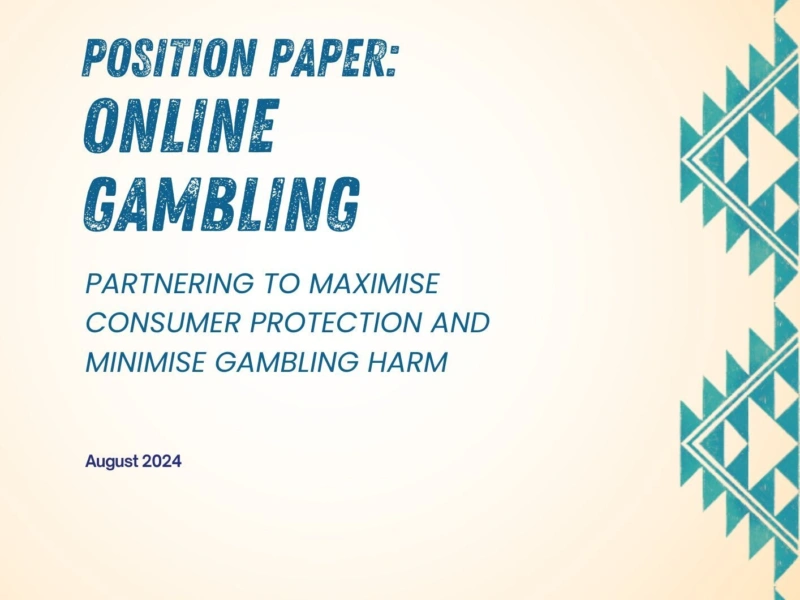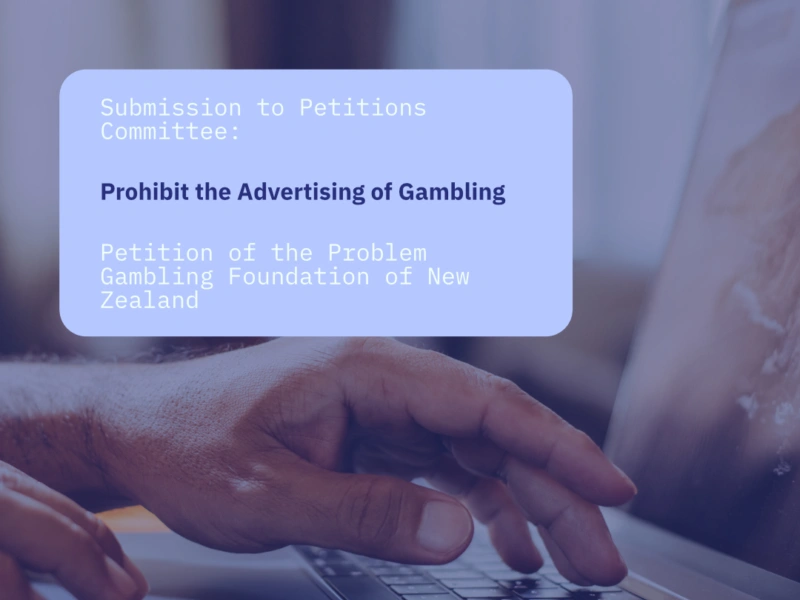What is the Online Casino Gambling Bill?
The Online Casino Gambling Bill has been introduced to Parliament. This is the legislation that will allow up to 15 online casinos to operate in New Zealand from early 2026 and sets out the process and rules they need to follow to get a license.
Read more to find out why we are concerned, what the research tells us, and why we encourage you to have your say. Submissions close soon. This is your chance to speak up.
First, a bit of background…
What are the rules now?
Right now, Kiwis can legally gamble on offshore online casinos, but it is illegal for those offshore casinos to advertise in New Zealand. Despite this, we have seen increasing numbers of advertisements targeting the New Zealand market and even social media influencers promoting offshore casinos. Anyone gambling on offshore online casinos are not protected by New Zealand law. We've heard stories ranging from people unable to withdraw their money to people who have received emails giving them extra credit to keep playing. It can be a very predatory environment.
We need regulation but will this Bill provide a safer, regulated environment that will place the protection of people over the profits of the gambling industry?
What's being proposed?
Here is a summary of what you need to know about the Bill:
Licences
Learn more
- There will be a 3 stage process for the granting of licenses
- Expression of interest
- Competitive process
- Final application
- There will be a total of up to 15 licenses
- Each license will be granted for up to 3 years with an up to 5 year renewal period
- Operators will be able to advertise "subject to restrictions"
- This is to attract people to regulated sites rather than non-regulated sites
- There will be an appeals process
Responsibilities of the operators
Learn more
- Operators must take all reasonable steps to ensure anyone using their platforms are 18 years of age or older.
- They must also take "all reasonable steps" to make sure they minimisine the harm caused by gambling.
- Operators have to ensure they have procedures in place to exclude anyone who has identified themselves as "problem gamblers".
- They cannot provide credit for gambling
- They must set up a formal complaints process and respond to any complaints within 40 days.
Enforcement and compliance
Learn more
The Department of Internal Affairs will be the regulator of the online casinos and will have tools to ensure the operators compliance. These are:
- Tools of enforcement like issuing formal warnings, take-down notices for unlicensed operators, and handing out fines.
- Cooperation with overseas regulators.
- Cancellation or suspension if operators break the rules or fail to do their due diligence.
Secondary legislation
Learn more
The Bill also establishes regulation making powers for:
- Harm prevention and minimisation
- Consumer protection and record keeping
- Advertising and marketing
- Fees, levies or charges to enable cost recovery.
To summarise...
- Up to 15 licences for online casino operators via a three-stage process
- Allowing licensed operators to advertise, subject to restrictions set out in regulations
- Prohibition and enforcement measures
- Requiring licensed operators to only allow access to people over 18 years of age with identity and age verification systems in place
- Licensed operators must take “reasonable steps” to minimise gambling harm
- Regulation making powers – the Bill grants authority to create secondary regulations
- A transition and timing process for the Bill
- Tax and levy requirements - 1.24% levy, GST, 12% duty on offshore revenue
Our position on the Bill
While we do support the regulation of online casino gambling in NZ, we do not support the Bill in its current form.
The bill creates a framework for licensing online casino operators, but it lacks key protections to minimise harm and safeguard consumers. Important rules about advertising, inducements, self-exclusion, and a company's responsibility to its customers are being left to be decided later through a process that is not transparent and excludes the voices of the wider community. This raises serious questions about the fairness and accountability of the final regulations.
The current approach disregards the public health principles of the Gambling Act 2003 and doesn't adequately address the needs of those most at risk of gambling harm, particularly young people, Māori, Pacific, and Asian communities.
Additionally, the bill lacks specific measures to honour Te Tiriti o Waitangi. It offers no assurance that Māori will be involved in the governance, design, or oversight of the new system, despite being disproportionately affected by gambling harm.
The bill also puts too much trust in the gambling industry to regulate itself. It requires operators to take "all reasonable steps" to reduce harm, which is a vague and weak standard that we believe is difficult to enforce and holds no real weight.

Our recommendations
The following are recommendations from us to the Select Committee. The aim of these recommendations is to support the creation of regulations that are fit-for-purpose, focuses on the prevention and minimisation of gambling harm, and protects our communities across Aotearoa, New Zealand.
1. Governance, Equity, and Public Health
Learn more
- Require all regulations developed under the Bill to be subject to open, inclusive consultation, in accordance with Section 372 of the Gambling Act 2003.
- Embed Te Tiriti o Waitangi into governance, ensuring Māori participation in regulation design, implementation, and oversight.
- Treat harm minimisation as a statutory objective, not a voluntary operator responsibility.
- Ensure the gambling levy is transparent, ringfenced, and proportionate to risk, funding independent research, whānau-led services, and culturally grounded prevention.
2. Harm Minimisation
Learn more
- Establish a centralised, government-led self-exclusion register that applies across all operators and is independent of industry control.
- Prohibit gambling on credit including the use of credit cards, Buy Now Pay Later (BNPL) services, or any deferred payment methods.
- Mandate real-time behavioural monitoring with clear intervention thresholds, to proactively identify and respond to signs of harm.
- Require mandatory cultural safety and harm reduction training for all operator staff, co-designed with Māori, Pacific, and other priority communities.
- Enforce strong penalties and transparent oversight, including independent audits, public harm reporting, and regulator accountability.
- Raise the minimum gambling age for online casinos to 20 years, aligned with land-based casino standards.
- Implement geo-blocking of unlicensed offshore gambling sites, with legal obligations on ISPs and penalties for non-compliance.
3. Advertising and Promotion
Learn more
- Introduce a full prohibition on all forms of gambling advertising, including digital, social, sponsorships, and influencer marketing.
- Legally define gambling websites, apps, and social media platforms as forms of advertising, subject to full restrictions.
- Prohibit affiliate marketing, paid endorsements, and culturally targeted promotions that disproportionately affect priority populations.
- Ban all inducements, including free bets, loyalty schemes, cashback offers, and VIP programmes.
- If any advertising is permitted:
- Require standardised, plain harm minimisation messaging (e.g. “Chances are you’re about to lose”).
- Enforce timing and placement restrictions, including a 10:00pm watershed and bans during youth-oriented or family programming.
4. Consumer Protections
Learn more
- Mandate a clear articulation of consumer rights, including access to independent dispute resolution, account closure, and refund processes.
- Introduce sector-specific data privacy standards to prevent the misuse of behavioural, financial, or personal data for marketing purposes.
- Ensure transparent display of odds, return-to-player (RTP) rates, and gambling risks in plain language and multiple languages.
- Mandate frictionless account closure, full integration with the national self-exclusion register, and rights to refunds in cases of harm.
- Require independent complaint resolution with binding authority, and public reporting of complaints and outcomes.
- Ensure all communications are delivered in plain language and culturally responsive formats.
People over profit
The recommendations here are safeguards that are currently missing. The Bill, as it stands, risks making this commercially driven that prioritises "market entry" over public health. This means it leaves individuals and whānau to to deal with unsafe gambling environments with poor protections.
Want to add your voice to ours?
We have a submission guide you can use so you can have your say on this piece of legislation.
This is a rare opportunity to reshape how gambling is regulated in Aotearoa. Your voice matters. Let’s make sure this Bill puts the wellbeing of people first.






